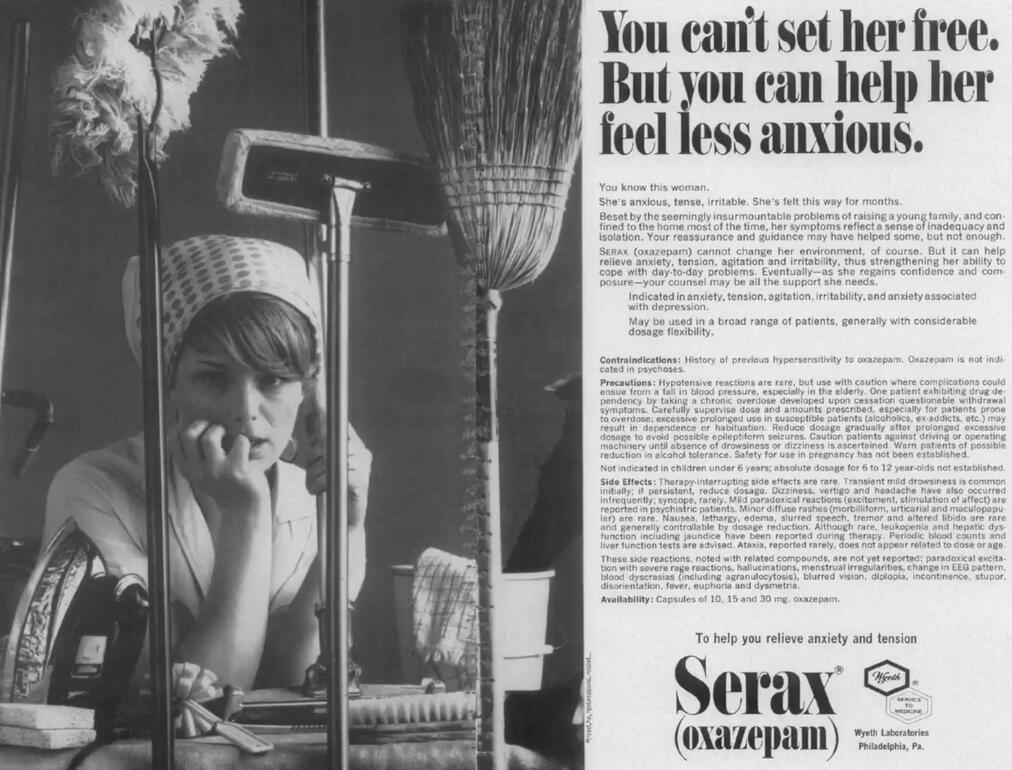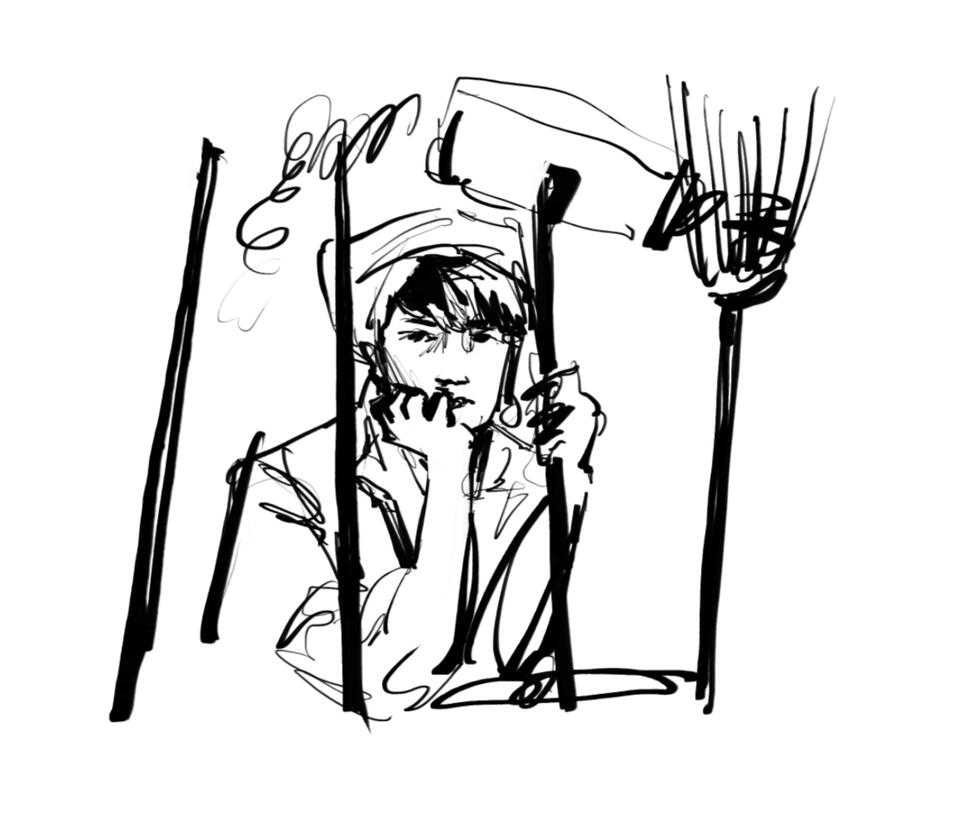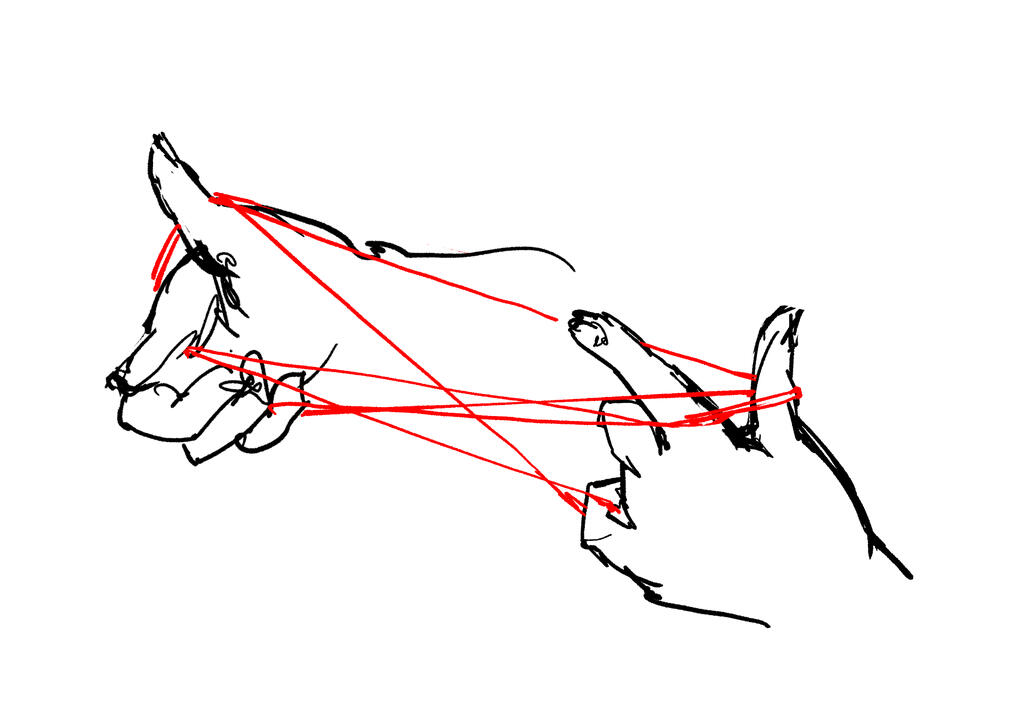The All Red Line

NEW:
Read the Magazine:
Excerpts:
We are currently stocked:
SOLD OUT - Tills Bookshop, Edinburgh
SOLD OUT - Warwick Books, Warwick
About The All Red Line:
The All Red Line was the name of the telephone network spanning the British Empire in the early 20th century.This network - and information exchange in general - was vital to maintain a vicious system of oppression.Information exchange is also vital to liberation.The All Red Line is a magazine dedicated to sharing the ideas, views, and the artistic expression of those who do not usually have space to do so.

For Birds
Jessie Irvin Rose
I have this dream and there is nothing I can do about it. Watching from the charcoal background, a bird’s eye view of my childhood bedroom. I see myself with long sunken fingers reach down into the screw top jar and hook the bird by her wing. I pull her out with a beckon, tiny body draped over a vulture fingernail. I set her on her feet, take her hand, and walk her down the stairs and into the world. Towards the sea, into the room. Lie her down. Put her there. Smile, stroke the fragile rib cage that is empty aside from a pattering heartbeat and a breath that has been caught there for a while. Hold her still.I can hear her murmuring I’m tired, I’m so tired. And then I leave her, and she is on her own again, but she doesn’t move, or struggle, just submits to it. Shrinks and waits for it to wash. And the worst part is, in my voyeurism, I don’t try to step in, or even call out. I just stay, resigned in the same way. Selfish, and soft. 100 years old and a child the whole time.When my great grandfather threw himself from a bridge he didn’t turn around and look back at the room he was leaving behind, he just saw the water. Didn’t fly, only fell. Left everyone else to the collapse, sealed himself in the romance of never coming home. I think of all the women sitting in silence and watching him fall over and over again, projected on the blank wall of the rest of their lives. Shells of people, but the big conch type that you can press your ear to and hear the ocean.I come from a long line of women who take things lying down, and I am built from the bones of sinking men.The shiny things in my pockets have turned into weights. They hang off of me like excess skin, I drag them around and they make my bones tired. Occasionally when the wind picks up, I feel it whip around the edges of me and I am held tightly where I am, not light enough to be carried anywhere at all. I’m grateful for that at least.I wrote down everything that happened in every day I lived, until the day I stopped. A hoarder of my life passing. The month before the end, I had walked myself into the late night, turning up in a part of my city I did not know and not having told anyone where I was going. With a weight, a heel in my chest I didn’t understand, maybe I thought fear would soothe me, like it had always promised to. A familiarity. But being lost only made me feel like a child again - not a comfort but an indictment of you know, you knew, you always knew.
The passage above is an excerpt from an original work by Jessie Irvin Rose. The full piece will be available in The All Red Line - Issue One. Pre-orders launch later this week.

An Interview with
Richard Siken
Conducted by The All Red Line
Richard Siken is a poet, painter, and filmmaker. His book Crush won the 2004 Yale Series of Younger Poets prize, selected by Louise Glück, a Lambda Literary Award, a Thom Gunn Award, and was a finalist for the National Book Critics Circle Award. His other books are War of the Foxes (Copper Canyon Press, 2015) and I Do Know Some Things (forthcoming, Copper Canyon Press, 2025). Siken is a recipient of a Pushcart Prize, two Lannan Fellowships, two Arizona Commission on the Arts grants, and a fellowship from the National Endowment for the Arts. He lives in Tucson, Arizona.
The passage below is an excerpt from an exclusive interview between Richard Siken and The All Red Line. The full piece will be available in The All Red Line - Issue One. Pre-orders are open below, and by purchasing in advance, you make the production of the magazine possible.
The All Red Line: My copy of Crush begins with Louise Gluck’s forward, where she proposes that “this is a book about panic”. How, and why, do you work panic into your poems?Richard Siken: Her foreword begins with "This is a book about panic. The word is never mentioned." I think she was very astute: panic wasn't a concern of mine, not as a condition or as a subject matter. How do you work panic into a poem? You don't work anything into a poem. A poem evokes a feeling by manipulating words. Craft choices are at the heart of all construction. Want to make a poem speed up? Use little words, lots of clauses, swift turns, enjambed lines. Want to slow a poem down? Use multi-syllabic words, difficult sounds, adjectives and adverbs to thicken the language, complex sentences, end-stopped lines.TARL: When you make your work public, and your audience find a subject or a feeling in that work - as Gluck finds panic - do you perceive that as them working the poetry into their own lives? In other words, Gluck has mapped her own feeling of panic onto your work. Or is there a vulnerability to writing poetry, in that, a feeling you may have tried not to express is expressed regardless, subconsciously?RS: I don't think anyone writes a poem trying not to express something. Sometimes you realize you had more to say than you thought, or that it was connected to deeper things. All art plays with vulnerability, risk, and self-betrayal.TARL: If that happens - the work takes from you more than you had expected - is there a point at which you go, that’s just too much to publish, to share publicly?RS: There's nothing I could think or share that hasn't been said by someone already. Shame, sadness, failure--none of it is particularly shocking. Here's a good example. I wrote the line "If you love me, Henry, you don't love me in a way I understand." That knocked the wind out of me. That line gets quoted a lot. It doesn't mean what people think it means. People like to see it as a justification of the speaker's feelings, a resounding placement of blame on Henry. Really, it's the speaker's confession that his understanding of love is gross and limited. It's still hard to read outloud, but it didn't take anything out of me to publish it.TARL: When a line like that is interpreted in a different manner than you intended, do you feel a responsibility for that?RS: If I was sloppy, and no one knew what I was talking about, then I would definitely feel responsible. If I'm constructing the poem well but the reader misses the irony, (or the sincerity, or the humor) then no, I don't feel responsible for that.TARL: You inhabit a lot of characters on twitter. Is ‘Richard Siken, the poet’ a character?RS: NoTARL: Would it matter if he was?RS: Would it matter to whom?TARL: I suppose the writer assumes a certain authority as they write. You know exactly what you want to tell me, right down to the place each word takes on the page. That’s a very one-sided relationship between the artist and the reader. Does the reader deserve authenticity in return?RS: Deserve is the wrong word. No one deserves anything. Honesty would be the wrong word. No one is looking for factual or autobiographical truth. Authenticity is exactly right. That's the goal, that's the heart of the satisfaction on all sides. Persona is valid. Personification is valid. Ventriloquism is valid.
The passage above is an excerpt from an exclusive interview between Richard Siken and The All Red Line. The full piece will be available in The All Red Line - Issue One. Pre-orders are open below, and by purchasing in advance, you make the production of the magazine possible.


'Footnotes' Magazine - from The All Red Line
Contents:
Introduction
Sam Stevens
Mason Granof
Kate Granholm
Jessie Irvin Rose
Welcome to ‘Footnotes’ from The All Red Line.
Issue One of The All Red Line came out in August. We put a lot of effort into making it physically beautiful, but this comes at a cost - its thirty-two pages mean we have to condense, edit, cut, and change what our writers produce. It's not that we're tinkering with unfinished or unpolished manuscripts: the joy and tragedy of editing this magazine is that even the parts that have to be left out could be a whole magazine of their own.We’re extraordinarily lucky to have such talented writers and artists and it’s very frustrating to have to leave quality work unpublished. Which is why we’ve produced ‘Footnotes’ - the magazine where our contributors get to elaborate - without limit - the ideas which they explored in TARL Issue 1. Some of this work is based on their Issue 1 piece, some of it is new. This is work written without considering physical space. All of it proves how lucky The All Red Line is to be able to call upon the talent, and passion, that we can.
Sam Stevens - Cuckoo
Cuckoo came a-calling
Songs of peace and love
Then he bit the beak off a
Turtle-doveCuckoo came a-crying
To the rich ripe plantation
Claimed the olive trees as his own
NationKicked the eggs out, devils,
Now it's free and clean.
Cuckoo don't rest till the nest is
PristineCuckoo hates the olive branch
He says is his home block:
"What did the peaceful country make?"
he crows, "the cuckoo clock."Cuckoo and eagle dream of dark
No plantation, no birdsong
No olives no trees
Just you on your kneesAnd at the gun's barrel
Where your thanks you will give:
And cuckoo on the olive branch
Where cuckoo don't live
Mason Granof - Truth and Psychopharmacology: “You Can’t Set Her Free”
In one 1967 advertisement for Serax (featured in the illustration for my article), the effect of maintaining social structures through psychopharmaceuticals is directly addressed. The limited and self-consciously conservative aims of psychopharmaceutical interventions are evident in the advertisment’s titular claim, “You can’t set her free. But you can help her feel less anxious.” As to the limited aims demonstrated here, psychopharmacology’s “rigor [is] directed toward reducing the illness to its strict minimum: the signs necessary and sufficient for it to be diagnosable as mental illness, and the techniques absolutely necessary in order for these manifestations to disappear,” (Foucault, “Psychiatric Power,” Ethics, 46). Rather than necessarily casting the medical gaze into the interior of subject in order to draw out the “truth” of their illness, psychopharmacology displaces and diffuses psychiatric power to the management of the immediate expressions of illness; that management of mental illness draws its evaluative metric from the social field from which abnormality can be marked and situated against an ineffable norm. As one 1970 television advertisement promised: “Valium... can help the transition back to work, back to a more normal life.” This normal life, defined by the ability to perform the prescribed social functions of both production and reproduction, is both the moral teleology and the empty representation that emerges from the mode of subjection.Inasmuch as the diagnostic metrics of psychopharmacology are that of “normal functioning,” they have a reactionary effect of tying the subject’s wellness to that specific norm. Figuratively imprisoned by the tools of domestic labor, the woman in the center of the Serax advertisement is described as follows: “Beset by the seemingly insurmountable problems of raising a young family, and confined to the home most of the time, her symptoms reflect a sense of inadequacy and isolation.” While the advertisement does seemingly (in a tongue-and-cheek manner) acknowledge the structural condition of gendered subjection under which this woman is suffering, the psychopharmaceutical intervention precisely aims to alleviate the resulting discontent from that gendered subjection, rather than the subjection itself; the ostensible effect of this intervention is – along with and as a result of the relief of symptoms – the maintenance of the family structure as well as this woman’s position within that structure.In prior eras of psychiatric practice, this woman struggling with family life may have been brought under a medical gaze in order to establish the truth of her illness/identity (marking her as an hysteric, for example); psychopharmacology enables the suppression of symptoms such that the moment where “truth” emerges might be perpetually deferred.
Psychopharmaceuticals produce a certain degree of “truth,” but it is through the notion of “authentic selfhood,” rather than the reality of the illness (which is ostensibly suppressed through the affective transformations enabled by the drug). In a 1999 advertisement for Paxil in the American Journal of Psychiatry, the tagline reads: “Relieve the anxiety. Reveal the person.” The expression of a mental illness can be read within this framework as the obfuscation or inauthentic modification of their “true self” – through the usage of medication which modifies the experience of a subject of psychopharmacology, the truth of their selfhood is established.As the psychopharmaceutical industry continued to grow and peddle its expanding catalog of medication, the power-relations implied by the establishment of a psychiatric truth were displaced into the relation the individual holds to themselves. This displacement partially arises through the conceptually conceived site of the psychiatric intervention: the brain’s chemistry. The psychiatrists of previous eras were tasked with plunging into a noumenal realm wherein the chimeras of unreason and disorder could be brought to light; psychopharmacology produced a model of mental illness that rendered the materiality of the patient’s brain into the object of inquiry and site of action. The dialogue between the psychiatrist and the patient is reduced from a truth-producing event to one that immediately links “knowledge of the nature of the illness and the suppression of its manifestations,” (Foucault, Ethics, 46) – the knowledge produced, so to speak, is not a knowledge of the mental illness as a separable object, but rather one of a complex of neurochemical interactions that express themselves through the subject.As historian of medicine David Healy explains, by the end of the 1990s, “in the form of a mental health industry... efforts to control behavior were aimed at a quarter to a third or perhaps even more of the population who had depressive symptoms or distress of one sort or another,” (Healy, The Creation of Psychopharmacology, 348). Increasingly exposed to an industry which expanded its claims of treatment along with its expanding classes of medication, broader and broader swathes of the population “all of a sudden... found out that they were abnormal,” (Healy, 349).The ethical subject of psychopharmacology is drawn to a mode of self-inquiry that obliquely mirrors the psychiatric model: Am I normal or abnormal? What are the signs/expressions of my abnormality? Slipping out of the confines of the medical journals and into the public gaze, the image of wellness delivered through psychopharmaceutical treatment – a neurochemical model of self-relation to maintain wellness – has become a powerful frame through which we shape our immediate reality.Abstraction of ValueCapitalism operates through and by the abstraction of human life. In analyzing Marx’s monetary theory and its relation to the emergence of private individuals, Deleuze and Guattari write: “The person [under capitalism] has become ‘private’ in reality, insofar as he derives from abstract quantities and becomes concrete in the becoming-concrete of these same quantities. It is these quantities that are marked, no longer the person themselves: your capital or your labor capacity, the rest is not important, we’ll always find a place for you within the expanded limits of the system…” (Gilles Deleuze and Felix Guattari, Anti-Oedipus, 251). Diagnostic abstraction has emerged alongside a social regime which marks human beings as private economic units. Atomization is not (merely) an allegorical description of our present state of disconnection and malaise, but rather a form of production; to the extent that it supports the production of surplus value, Capitalism produces atomistic individuals in the much same way it produces a new car.In Marx’s analysis, capitalism (and the commodity form as its visible incarnation) is rendered possible by the convergence of two separate historical processes: 1) the abstraction of wealth (use-value) into value (exchange-value) through both the development of the monetary form into a general equivalent for human labor and emergence of finance capital “in the pores” of pre-industrial society ) 2) the privatization of land into private property producing a population of workers with nothing to sell but their labor (i.e. the proletariat), along with the privatization of the individual through the legal establishment of property rights. These pre-conditions of industrial society, the abstraction of value and the privatization of individuals/property, are sustained by a technical police regime of control (marking, distributing, and monitoring individuals according to abstract quantities, creating “knowable man”) and an imperial regime of exploitation/expropriation (extracting surplus-value from the proletariat and expropriating resources/slave labor from colonized territories/peoples).The Nihilism of Well-BeingWithout an apparent political alternative (Fisher’s “Capitalist Realism”), the resolution of suffering becomes a rather pathetic odyssey of “self-discovery.” The integration of mental health discourse as identity-structure corresponds, in my opinion, to a broader trend within liberal capitalist culture in which the ego forms the sole horizon of available meaning. The search for Truth has become a search for the truth of one's self. An obsession with “authenticity” and the actualization of one’s “true essence” is a modified, self-centered form of the substance ontology underlying Western metaphysics.The search for “authentic well-being” is the irresolvable search for an impossible Real – a black hole at the center of the subject, a void at the heart of Being. Mental health discourse, promoting a search for the authentic self, swirls around this absent center in a contradictory movement: by erecting abstract, diagnostic identities, it provides a hollow architecture for the subject’s self comprehension, while also asserting that this identity impedes the “truth” of the subject (i.e. your mental illness impedes your access to reality, your access to your true self); diagnosis is the “truth” of the subject that also rejects the subject’s phenomenal access to truth. No wonder people desperately cling to their diagnosis as identity, given the abyss which necessarily ensconces diagnostic abstraction. Psychologists bemoan the proliferation of “self-diagnosis,” even though this was an inevitable outcome of their project, which always necessitated the ethical integration of diagnosis as identity.But the Real is not impossible, despite the degenerated form of psychoanalysis that predominates in psychology; reality is, however, quite difficult to confront directly, particularly under a totalitarian regime that has genocide as one of its component parts. As Walter Benjamin writes: “the immediate Messianic intensity of the heart, of the inner man in isolation, passes through misfortune, as suffering.” The spiritual alchemy which draws meaning out of the abyss is stunted by a form of subjectivity that cannot transmute suffering into communion.
Kate Granholm - TARL Issue One: In Progress



Above:
Kate's work-in-progress sketches for Mason Granof's The Privatisation of Suffering, along with the advert on which they were based. Final work can be seen in The All Red Line: Issue One.

Above:
Kate's work-in-progress sketch for The All Red Line Telephone operator, which accompanies the magazine's introduction. They're based on Rosemary, the ever-charming telephone operator from the 1974 cartoon, Hong Kong Phooey.


Above, left:
Draft for Are We There Yet
Above, right:
Draft for the accompaniment to Jordan Dowd's essay Three Counter-Productive Narratives About Learning and Ability
Jessie Irvin Rose - On The Colour Yellow
I have swallowed a crow. There is a murder in my stomach. In the cathedral garden in July we
watched them swarm. In November they made fractious light into television static in the sky.
It isn’t the colour of the blood, and it isn’t the colour of skin. It isn’t something about darkness or
the curdled edge of shadow. It isn’t the curtains, or your eyes, or the snow that has been turning
to black ice for 3 days. It isn’t the way the smog sets on the way home, or how teeth look when
they are overworked and unrested.It is after everything, when the light is being kind to us. And it is yellow yellow yellow.
I must have left myself on a train somewhere. I am travelling up and down the country, catching
commuter flu, getting steam cleaned at the end of every day, waiting in the depots at night,
sliding through doors onto platforms and being bundled into another rush hour going in a
different direction.Not one crow falls from the sky without God knowing. Or was it a sparrow? I am left here in a jet
stream trail of things that should be able to startle easily, and yet can’t. Nothing startles in a
dead city. Nothing startles if it is dead. Max Porter says doctors, ghosts and crows are the only
ones who can have theatrical battles with language and God. I hope I am one of those one day.
I am set on fire in the same way a building would be. The city eats me alive. My home is empty
of you, awful ghosts.When I leave the doctor’s there is a dead fox, so perfect it could be sleeping, lying in the yard of
the church that only does masses in Latin. I hope they bury it. I have been told that Catholics
will not send animals to heaven, so maybe they’ll just put it in a bin somewhere. Lift its
person-body out of the front yard with a plastic bag or a spade and into a heap to decompose.
The next day there is a dead pigeon on the other side of the fence. This morning a squirrel, legs
turned to the sky and soft white belly all open. I kill a spider in the shower. I die in a dream over
and over and over again until all my friends tell me they are sick of me.I was 16 when I escaped my high school prom early, and sat on the beach instead. We thought
it would be cinematic, sophisticated I suppose, to leave everyone behind. And it was very quiet
and the sea was very black, and we felt it all coming to a close. A fox walked past the shoreline,
toe pads in the tide foam, and it was too big to talk about but we saw it. Saw the wash of grief in
the water. Waited for the day we didn’t know each other anymore, when the birds would come.
Ted Hughes said something changed after God said ‘you win, crow’. I can’t remember what that
was either.In the night a gull lifts me as high as it can and then spreads its claws and I am smashed
against a sea rock, splintering bits of shell all over the place. It swoops down and grabs the soft
fleshy parts of me, looks me in the eye, tears, and does not swallow me whole.
Sheila Heti’s grandmother’s secret to a lasting marriage was ‘You eat crow.’ But at the peak of
humiliation, crow begins eating me. My aortic connection to a place haemorrhages. I am
existing in a time, not a city. Not on this beach. Not where I thought I was. Not in my home, on
my street. I feel the swell of it, find Avalon for a moment, and then the foxes come. They do
come. I have this fear that his mother hands me a rosary on the day I am married, telling me I
look as hungry as she used to be. By the reception, I am so full up that I can’t eat anything, and
everyone is furious because I made such a huge deal about the specifics of the catering that
their lives were miserable for weeks.A person becomes a ruin and the birds fold themselves into the crevices like graveyard walls.
Time reaches into me and touches me. I am gutted like a fish. There is rice in the rice cooker
and it sings a tiny song and I am pretending to be dead on the floor, until I get over myself, get
up, eat my rice, sleep. Chop my head off when I get a chance.I tell the doctor that I am tired of the surface, pleasant nostalgia doesn’t do it for me. I am seeing
in pastels. Nothing really hurts like it used to, nothing dies, it just stays dead. No sickness of
skin, no jaundiced eyes or nausea, nothing that bites and nothing that is bright. I don’t feel
much, I miss the plague I used to have. I drift in the soft nothing of the places I don’t intend to
stay. She prescribes me three handfuls of dirt from the earth beneath my window every morning,
and sends me away. Says I should be grateful for my nothing, when everyone else is split in
half. I tell her that it has been a long time since I let myself settle in one spot long enough for
another to pull at me. She doesn’t find that very funny.A crow follows me home and there are foxes at my doorstep. And then, at 7, the light over the
highest volcano in the suburbs. It sets in and there is something. Not quite as sickly or as
sallow, but something.***“The crows assert that a single crow could destroy the heavens. This is certainly true, but it
proves nothing against the heavens because heaven means precisely: the impossibility of
crows.” - Franz Kafka

The 2024 US Presidential Election
The All Red Line Autopsy

The 2024 US Presidential Election
The All Red Line Autopsy
What Happened?
Mason Granof
Well, it looks like we’ve done it again. Donald Trump is set to become the 47th president of the United States.
For the Democrats, it was more important to remain a center-right party than it was to win this election. This was obvious in 2020, when the party did everything possible to upend the possibility of a Sanders candidacy (and its model of mass politics), instead rallying around a (then) 78 year old man who was visibly in mental decline. Completely beholden to a class of donors that would suffer financially from policies like Medicare-for-All, the Democratic party was structurally unable to offer anything meaningful to voters.
During a global pandemic (which the Republicans were actively making worse), the Democrats barely managed to eke out a victory against Trump, and then only held the House in 2022 because of the Dobbs decision to remove legal protection for abortion.
"For the Democrats, it was more important to remain a center-right party than it was to win this election."
This cycle, rather than holding a primary that could have selected a popular candidate, the Democrats and their media apparatchiks chose to conceal the extent of Biden's physical and mental degradation until the last possible moment, forcing a Harris candidacy on the party.
Domestically, the Biden (and Harris) campaign chose to tack to the right on nearly every issue, particularly immigration and trans rights. Ostensibly, this was a strategy to capture the mythical “moderate Republican voter” (a fictional electorate which has always been a thinly-veiled stand-in for their own donors). This appears to have succeeded in swaying almost no one. While Republicans were ranting about immigrants eating dogs and cats, the Harris campaign promised to end asylum and build the wall. While Republicans ran on trans panic (such as Trump warning about “transgender operations on illegal aliens in prison”), Harris said she would “follow the law” when asked about protecting trans healthcare. Voters who consider immigrants and transgender people to be an issue were always going to choose the party that is unabashedly nativist and transphobic rather than gambling on the diet-fascism of the Democrats.
Abroad, the policy agenda of the Biden administration was at best, hapless, and at worst, Hitlerian. Biden’s favorables never recovered following the messy withdrawal from Afghanistan, which many Americans viewed as an embarrassing capstone to a generational catastrophe of imperial policy. The Democrats also further aggravated our relationship with China, adopting Trump’s trade war policies and promoting Red Scare style panics about Chinese spy balloons. In Ukraine, Biden's policy of funding a proxy war against a nuclear power and one of the world’s foremost oil producers has been less than successful (unless, of course, you are a Lockheed-Martin shareholder). This administration refused to pursue any off-ramp toward a peace process, instead sacrificing a generation of Ukrainians for the ambiguous (and failed) goal of deteriorating Russia militarily and economically.
"Voters who consider immigrants and transgender people to be an issue were always going to choose the party that is unabashedly nativist and transphobic rather than gambling on the diet-fascism of the Democrats."
The only tangible gains from our adventure in Ukraine has been Sweden entering NATO and skyrocketing domestic commodity prices, neither of which won the Democrats much support. On foreign policy, Trump is perceived as more of a dove, and the Harris campaign did less than nothing to dissuade them of that notion.
Most consequently for the election, the Democrats chose to provide unconditional military aid and diplomatic cover for Israel’s genocidal wars. Unsurprisingly, a year of dead children, bombed hospitals, and mass graves did not energize the base. Rather than courting the hundreds of thousands of Arab-Americans in the Rust Belt, the Democrats sent Bill Clinton, an Epstein associate, to tell them that their relatives deserve to die; they also touted the endorsement of Dick Cheney, a man who killed a million people in the Middle East and left office with a 13% approval rating. All the while, Democratic mayors and governors repeatedly deployed police to brutalize student protestors. Kamala refused to create any daylight between herself and Biden on the Gaza genocide. The effect of this policy is quantifiable: Kamala lost by massive margins in Michigan counties that Biden won easily in 2020 and depressed the youth vote nationally.
Although Republicans will certainly take this victory as a mandate for their bigoted agenda, it does not change the fact that progressive policies remain broadly popular among the American electorate. Most Americans support access to reproductive care. Most Americans support trans rights. Most Americans support Medicare-For-All.
Even though the Republicans secured the popular vote for the first time in two decades, Trump still received fewer total votes than he did in 2020. This election is less a demonstration of Trump’s popularity than it is an indictment of a Democratic party which refuses to adopt a platform that appeals to anyone but their donors.
"The Democrats ran on nothing, won nothing, and, in all likelihood, will learn nothing."
Instead, the Democratic party had one pitch: “The other guys are worse.” After four years of expanding wars, economic hardship, and a pandemic which never really ended, Harris offered more of the same. Trump, at the very least, offered fake solutions to real problems. The Democrats ran on nothing, won nothing, and, in all likelihood, will learn nothing.
The 2024 US Presidential Election
The All Red Line Autopsy
What Will Happen?
Charlie Kip
There has been a lot of noise about Trump’s second term being heavily autocratic and that he will be a dictator. At the same time, I’ve seen pushback from the left suggesting that America is already fascist and Trump won’t be significantly worse. There’s merit to both of these and I’ll try to cut through the noise. As a note, I largely do not cover the economic implications of these policies and only give a cursory view of foreign policy implications. This is not from lack of importance but because most of my expertise is in law and domestic government structures and so I leave more in-depth analyses of these very important subjects to my more qualified comrades.
The general theme is going to be Trump’s power will be defined by what others with power are interested in seeing him do. To that end, let’s start with the two key differences between now and Trump’s first term: he has majorities in both chambers of Congress and will start with a favorable Supreme Court, possibly becoming more favorable over the course of his term. While the president has immense power on their own, these other two branches of government serve as heavy restrictions on their power. If the legislature is willing to play ball with Trump’s agenda, this will expand what he is able to do substantially.
This becomes particularly salient if the Republican Party is willing to do away with the filibuster - a procedural tool that allows the minority party to prevent legislation from coming to the floor for a vote. I’ll cover the Supreme Court justices a bit more below, but the important takeaway for now is that the right wing of the court currently has a 6-3 majority, with 3 of the 6 being Trump appointees from the first term.
They have thus far been fairly lenient with restraining Trump and we should regard any claims that they will serve as an important constitutional check on his power with healthy skepticism.
"Trump’s power will be defined by what others with power are interested in seeing him do"
Presidential Power: The Courts
Diving into what the president is able to do without the legislature - a scenario we may find very important depending on how the landscape of Congress shakes out - we’ll cover some of the presidential powers. To highlight some of this, let’s discuss the Trump v. US presidential immunity Supreme Court decision. The first thing I want to emphasize is what this case does NOT say. It does not confer unlimited power onto the president to act however they please. What it does do, is shield the president from legal liability for “official acts.” Official acts are nebulously defined in the decision, but I think the best way to understand them is things that they are actions expressly authorized by the Constitution or statute. The example the Supreme Court hinged on was that conferring with the Attorney General about potential prosecutions is always an official act, but ordering the Vice President to act a certain way during vote ratification proceedings might be considered unofficial depending on specific facts. This distinction highlights two important points.
First, an improper action and an improper reason are required to break through this immunity, similar to an actus reus as well as a mens rea being required for criminal prosecution1. Since the Attorney General was never ordered to prosecute Trump’s political opponents, there is no improper action and if he had a sufficient justification for asking Mike Pence to refuse to certify the election results, there would be no improper reason. What this will mean in practice for potential criminal prosecutions is not clear. The Supreme Court has largely left the issue to the lower courts to sort out the details of these distinctions, but it will not be material for the time being. The DOJ will not continue prosecution of a sitting president and so the cases will go away - Trump will likely not face prosecution at least until he leaves office but possibly not ever.
The second important component is that lack of legal liability is not the same as the ability to act. Even if the Court unambiguously found that ordering Mike Pence to decertify election results was an official act immune from prosecution, this would not alter the fact that Mike Pence had the power to refuse to follow that order and certify the results anyway. And here we have the very important rub of Trump’s second term: his power will largely be defined by what the people he orders around are willing to comply with. In general, the more an act falls within traditional guardrails of the constitutional system and norms of government, the less of a fuss civil servants will make. The more outrageous the demands are, the harder they will be to pull off. In conclusion, the immunity decision is unlikely to be heavily consequential to the Trump presidency. It does not take away impeachment as a tools of removal and because of DOJ policy, it will only affect post-presidency proceedings. It would only matter if it were a deterrent to his behavior, but it would be foolish to assume Trump is deterred by the threat of criminal liability - meaning it is only relevant for the potential of “bringing him to justice” after exiting office. The more dangerous component of this decision is it signals a Supreme Court interested in ducking questions about Trump’s behavior and a potential unwillingness to restrain him.
To highlight my broader point, I want to point out how many people would need to comply for Trump to have successfully pulled off his coup in 2021. Mike Pence would have to agree to decertify the results, the Supreme Court would have to back it, the legislatures would need to comply, and likely law enforcement and the armed forces would need to be willing to enforce acceptance of the coup among the general populace.
"it would be foolish to assume Trump is deterred by the threat of criminal liability"
This is not to say this is impossible, but to talk about where checks and balances lie - it is crucial to understanding the actual power Trump holds.
The easy things to talk about regarding this power are political appointees and executive action. The president has near limitless power to appoint whoever they pleases to serve in the cabinet, other federal agencies under executive branch supervision, or as federal judges. The theoretical limit is that the Senate confirms appointees but with a majority republican senate it is unlikely that will serve as much of a guardrail. Additionally, rumors are afloat that Trump will try to exploit a loophole to appoint all of his cabinet during congressional recess - circumventing approval altogether. This means the administration is likely to be filled with all manner of loyalists and general extremists. Notably, his Secretary of State, Marco Rubio, signals a potentially much more hawkish stance on Cuba and Venezuela and his Secretary of Defense, Pete Hegseth (a Fox News host famous for denying the existence of germs and war crimes), signals a potential less apologetic and even more violent middle east policy.
To revisit the Supreme Court, it appears quite likely is that Clarence Thomas and Samuel Alito will choose to retire during this term and will be replaced by Federalist Society picks in their 40s; creating a 5-Trump Appointee majority (plus John Roberts, another Republican operative) that will likely serve through the end of the climate apocalypse unless a future president is willing to increase the size of the court. This is compounded if Kagan or Sotomayor have significant health issues forcing them into early retirement or an untimely death and Trump potentially ends up with 6 or 7 appointees. Assuming no one has the will to fight this in a meaningful way, we will likely see a handful of judicial trends over the next 20 to 30 years. First, Substantive Due Process will be largely eradicated as a doctrine. While the argument for SDP has been incredibly controversial, it became the basis for a number of major civil rights landmarks: gay marriage, abortion access, birth control access, and rights against forced sterilization of prisoners and the “mentally unfit.”
It seems likely that all of these rights will be stripped in the coming years as states and plaintiffs find the right cases to get in front of the court. Two places that I think are likely to remain protected are federal recognition of state-recognized gay marriage and interracial marriage. The reasons for these are fairly straightforward: the court will likely leave the decision to legalize gay marriage to individual states. A previous Supreme Court decision (Windsor) found that the federal government had to recognize gay marriage if legal in the state - John Roberts voted with the majority on this case and it has since been codified by Congress in the Respect for Marriage Act, making it more difficult for the Supreme Court to destroy. Interracial Marriage was legalized in a decision called Loving v. Virginia - it has the benefit of being made based upon the Equal Protection Clause rather than the Due Process Clause and as a result, will be harder to uproot due to being less controversial.
"unitary executive theory is a previously rejected legal doctrine that suggests the president must be able to fire any employee of any agency at will... it is possible that we will see it implemented."
This likely extends to early civil rights decisions such as Brown v. Board of Education, ending segregation. This case law is far less controversial, even among the extremist Federalist Society. However, we are also likely to see a more rigid reading of the Equal Protection Clause; one that is used less to promote equality and more to prevent any programs that may benefit minority groups.
Presidential Power: Administrative Agencies
The other major area we will likely see a shift in legal doctrine is administrative agencies. As a quick overview, the executive branch of the US government is usually understood to simply contain the President and his staff who make up these agencies. In practice, the staff end up wildly important and non-political employees of these agencies have great influence over the policies they end up implementing. Longstanding Supreme Court doctrine protects these employees in their job security, preventing the president from firing them directly. However, there is a theory popular among some conservative circles called the unitary executive theory. This is a previously rejected legal doctrine that suggests the president must be able to fire any employee of any agency at will, essentially removing any institutional guardrails on technically legal but perhaps non-normative or extreme executive action by the president. Implementing this theory is a key component of the infamous Project 2025 but doing so would require the Supreme Court to overturn a long string of old cases. This has support among some current Trump appointees, notably Neil Gorsuch, and it is possible that we will see it implemented. If so, executive action, addressed in a later section, may skew towards some of the more extreme ends of possibilities.
Let’s now talk about these possible actions. For me, one of the best representations of where we see the power of the president is in the National Labor Relations Board (NLRB or the Board). The role of the Board is the enforce the National Labor Relations Act (NLRA) and maintain the current social settlement between employers and unions. The president does not have the power to repeal the NLRA or disband the Board, but they are entitled to appoint all the members of the Board and the General Counsel, giving huge influence on how the NLRA is interpreted. To give an example, in the first Trump term a case reached the board to determine whether or not graduate students were considered employees protected by the NLRA. Under the first Trump Board, they found they were not and so graduate student unions were not protected under US labor law, functionally defeating all organizing efforts. Under Biden, the Board ruled the opposite, allowing graduate students to unionize. This will likely flip back in the second Trump term, restricting once again the pool of workers eligible to unionize. Enforcement mechanisms can also change. Under Biden, the landmark Cemex decision gave the Board authority to issue bargaining orders to any employer who committed an Unfair Labor Practice prior to a union certification election, creating a substantial deterrent for employers to even flirt with the idea of interfering with an election. The Trump Board will likely revert this to the prior status quo; making the remedy for union election interference a re-run election, essentially allowing employers to stall out the bargaining process, potentially indefinitely until the main organizers move on.
It’s worth noting here that there are ongoing legal battles in some jurisdictions over whether or not the NLRA is constitutional at all. It is unlikely to me that these succeed at the Supreme Court simply due to ubiquitousness and longstanding doctrine, but it is not outside the scope. If this happens, union protections will disappear altogether. However, these battles are largely independent of what the Trump Board does and more reliant on what the make-up of the Supreme Court is when the case reaches it.
"Very little enforcement will occur... making civil rights violation a business decision, one which can often be profitable."
Other agencies that are likely to be affected are the Department of Housing and Urban Development (HUD), the Environmental Protection Agency (EPA), the Department of Education (Ed)2, the Department of Justice (DOJ), and the Federal Trade Commission (FTC). I’ll briefly note each of these. Under Biden, HUD had more of a focus on public housing and making sure the government maintained stewardship of affordable housing. A Trump HUD will likely look more to the private market, relying more on things like tax credit programs to build housing and trying to pivot further towards Housing Vouchers3 or even purely private solutions such as deregulation. The EPA and Ed have similar problems to each other; Trump does not want either to exist. He lacks the authority to disband them - agencies are created by Congress and therefore the existence is beyond his control (though Congress may oblige him and disband them) but he can do a lot to disrupt them.
One tool we will likely see is moving offices to a far-out state - say, moving the EPA headquarters to Wyoming. This will likely cause most of the career civil servants to quit rather than relocate and leave the office dramatically understaffed and useless. This is a tool he can use to remove his perceived political opponents from power even if the Supreme Court does not endorse unitary executive theory. If this happens, it can be operated mostly by loyalists who will strip regulation and do not do much else. DOJ, responsible for federal prosecution and enforcement of laws in court, will be significantly reduced in that the civil rights division will mostly go defunct. Very little enforcement will occur (and some of the other agencies will aid with this, for example, HUD can implement regulations weakening the Fair Housing Act and the DOJ can choose not to enforce the weaker version), and when it does cases can be settled in ways that are more generous to offenders (such as lower fines), essentially making civil rights violation a business decision, one which can often be profitable.
"it is my belief that the the US hopes to use the current conflict as a vehicle to regime change in Iran"
Finally, the FTC, responsible for a lot of business regulation, has been incredibly aggressive against anti-competitive behavior, particularly against tech giants. With Trump in power and Elon Musk operating behind him, it is incredibly likely Lina Khan, the current commissioner, will be fired, and replaced with
some sort of Silicon Valley entrepreneur, and we will see deregulation run rampant and tech monopolies become far more entrenched. Of course these won’t be the only affected agencies, but I believe this run-down gives an idea of what you can expect from the others.
In terms of foreign policy, it seems likely that aid to Ukraine will drop significantly or 0, and support for Israel will drop almost any pretense of restraint. Mike Huckabee’s appointment as ambassador to Israel signals a very annexationist policy and a very evangelical, almost crusader, view of the US role in the region. It strikes me as unlikely that the international community will have substantial interest in halting Israel’s genocide of the Palestinian people and we should expect the ethnic cleansing of the area to be successful. In terms of further expansion, it is my belief that the US hopes to use the current conflict as a vehicle to regime change in Iran. I can only assume the neoconservatives Trump appoints will be even more interested in this policy and we should expect to see more aggression from Israel into other sovereign countries, most likely attempting and possibly succeeding in provoking a full-on ground war in Iran. I would not be shocked to see US boots on the ground in the next few years. This could get messy if other superpowers lose a sufficient degree of faith in international law and decide to intervene militarily.
Enabling and Resisting
I’ll end by pivoting back to our tricky problem: what will people say yes to, by discussing immigration. His rhetoric on immigration is far more violent than the Democrats, but it is worth noting that both Obama and Biden deported people at a higher rate than Trump did in his first term. Additionally, there have been reports of ICE training civilians to help enforce immigration laws under Biden. The infrastructure the Democrats built to show they are tough on the border will likely be weaponized by the Trump administration to carry out its plan more violently. Already, there are reports that the Trump administration is considering sending federal agents and law enforcement from red states into “sanctuary cities”4 to round up undocumented people for deportation. Congress is supposed to have plenary power5 over immigration policy, but enforcement is still in the hands of the president.There are of course limits here - it would unquestionably be illegal for Trump to simply order ICE to execute all undocumented people they find - but he could deploy more federal officers as he saw fit. The biggest concern to me is that he may be able to get away with even clearly illegal actions. The Court already deferred some power by declining to provide injunctive relief against Texas when Governor Greg Abbott decided to add state militarized presence at the border and potentially would be hesitant to restrict a Trump administration from enforcing immigration laws. Using our example of mass executions, you would need someone to say no. The particularly scary part is even if immigration advocates managed to find 5 votes on the Supreme Court to stop an action, it is hard to rule out Trump demanding his agents disobey the court and obey him instead.
If this happens, we end up with a very classic question yet very foreign to US history: where does the loyalty of the people with the guns lie? We could end up with a major Constitutional crisis in the most extreme circumstance and we will see how strong the backdrop of checks and balances is. I’ll conclude with this: it is unlikely that within the guardrails of US constitutional order Trump could assert himself as a dictatorial power, however, I’m also not convinced there aren’t sufficient people who are interested in seeing him do so even at the expense of US Constitutional order that he can’t do it anyways. A sufficient volume of power has to say No and we will see if that volume still exists in this country.
Footnotes
1. I won’t delve too deeply into criminal law here, but for those looking for a brief explanation: an actus reus is an action and a mens rea is a guilty state of mind. To give you an example, consider New Mexico’s murder statute (NM Stat § 30-2-1), distinguishing first degree murder in section A from second degree murder or a lesser homicide offense in section B. The actus reus in all cases is the death of another, without having caused a death you have no murder (you may have an assault or an attempt, but these are separate actus reus from the question in a murder statute). The mens rea distinguishes the types of homicide that are possible. Section A lays out a number of intentions (premeditation, commission of another felony, or depraved heart regardless for human life) that would constitute a sufficiently “guilty mind” to convict for 1st degree murder. Meanwhile section B lays out a mental state (knowledge of high probabiliy of causing death) sufficient for 2nd degree murder and highlights a number of other mental states (provoked or in a heat of passion) that may lower the offense to a manslaughter or even no charge. The idea here is that a guilty mind alone or a bad consequence alone are insufficient to punish an individual, you need both.2. Not to be confused with the DOE, which stands for the Department of Energy3. Rather than state owned or operated housing at a discount, the state agrees to pay part or all of your rent to a private landlord4. This is constitutional. Sanctuary cities arise out of the anti-commandeering principle of federalism - that the federal government cannot require officers of indivdual states to cooperate in federal operations. Often, states will voluntarily assist the federal government but in many cases blue states decline to report any undocumented immigrants. However, none of this prevents the federal government from carrying out its own goals within the state, they simply can’t force state officers to help.5. That is to say, no other body may interfere. Not states, not the executive branch, not the courts.